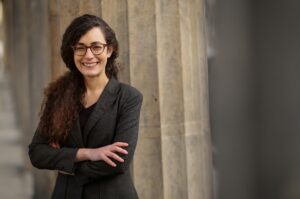Grinbergs tekhter
Act I. Zalmon Greenberg is a prosperous butcher on the Lower East Side. His world consists of his unlettered, simple-minded, and devoted wife, Sarah; of his two children, Esther and Bessie, the former a shy, modest, dutiful homebody, the latter a jazz-baby and frequenter of cabarets and dancehalls; of his pious and learned uncle Aaron, and his shrewd, sharp-tongued, yet kindly aunt Hennie, whom he has brought over from Europe, given a home and set up in business in his own house; of his customers and neighbors and, finally, of his daughters’ lovers: Dave Levinson, who has been in love with Esther since childhood, to the great chagrin of his father, who keeps a dry-goods store across the street from the Greenbergs and ranks butchers rather low in the scale of social and matrimonial merit; and last, but not least, Bessie’s beau, Max Bernstein, a prize-fighter, who attributes his recent knockout at the hands of Kid Bushie to the fact that the trunks he wore for the fight did not have a Star of David sewn on them. Though somewhat Americanized, Zalmon retains the psychology and general views of the Old World. He refuses his daughters’ plea that the family join in the general exodus from the Lower East Side; and in order to silence their complaints, he takes advantage of their absence in the country, where they are spending their vacation, to beautify his house by having it painted and installing modern improvements and new furniture, including a radio, so as to surprise the girls upon their return. As the play opens, a painter is seen at work in the butcher-shop, while an expressman delivers new furniture. A letter arrives from Bessie in which she informs her parents that Esther has shed her customary shyness and modesty in the country and is carrying on “high and mighty” with a traveling salesman who is stopping at the same hotel; she even suggests that it would be advisable for her and Esther to return home at once. Bessie’s remarks fill Zalmon with indignation and attributes them to jealousy, but Sarah has some misgivings. At this point Aaron rushes in terror-stricken and reports that his bookstore is being raided by the police who are falsely charging him with being a bootlegger. While Zalmon and Aaron hasten to the latter’s store, Sarah asks Dave to come in. No sooner does he enter than Max Bernstein arrives. Sarah shows them a picture of her daughters that Bessie enclosed in her letter, and the two young men are discussing plans for spending the week-end with the girls, when the elder Levinson enters and summons his son back to his work at the dry-goods store. Left alone with Sarah, Max tells her that he is giving up pugilism and opening a poolroom. He has already invested a thousand dollars and needs a hundred dollars more. Sarah lends him a hundred and fifty, and he departs. Zalmon and Aaron return, the misunderstanding with the police having been satisfactorily cleared up, and the two go upstairs to try out Zalmon’s new radio, only to discover that a radio is not all it is cracked up to be. Max comes back to report that he has just signed a contract for a return match with Kid Bushie and so isn’t going into the poolroom business after all. He returns the money he borrowed from Sarah and declares his intention of going to Bessie in the country and establishing his training quarters there. No sooner does he leave than Bessie suddenly arrives–alone, Esther having eloped with the traveling salesman the day before.
Act II. Three weeks have passed and still no trace of Esther. From a conversation between Bessie and Max, we learn that the latter is through with prize-fights, Kid Bushie having knocked him out again, though this time he was careful to have a Star of David sewn on his fighting trunks. The two discuss plans for their forthcoming marriage and for settling in California, where Max is sure a fortune is awaiting him. He expresses surprise that so quiet and modest a girl as Esther should have yielded so soon to temptation. Bessie attributes her sister’s fall to the fact that she had never associated with men and so fallen an easy prey to the first one who whispered sweet lies into her ears. Aaron, Hennie and Sarah try to dissuade the two from getting married at this time, but they are adamant, and find an unexpected ally in Zalmon. The latter then sends for Dave and tells him the truth about Esther’s absence from him. Dave staggers out of the house, and Aaron and Hennie rush in to scold their nephew for what he has done. Presently a young woman enters and announces herself as Lena Becker, wife of Esther’s seducer. She relates the circumstances under which she found Esther, whom she absolves of all blame in the matter, and who, she says, bitterly repents her mistake and above all the wrong she has done to her by betraying his great trust in her. Mrs. Becker adds that she has brought Esther with her and left her at Aaron’s store. While Sarah and Hennie run to fetch her, Aaron pleads with Zalmon to be kind to his erring daughter, because a sinner who truly repents is, according to the Talmud, superior to a person who has never sinned. Esther is brought in and is greeted by her faltering father with: “How are you, Esther?”
Act III. Hennie remonstrates with Sarah for keeping the butcher-shop closed now that Esther is back home and Dave has given her an engagement ring. She threatens to take matters in her own hands and hire a butcher to run her nephew’s shop. Aaron comes in with the startling news that Zalmon has sold the house, and that he is now showing the premises to the new proprietor. Presently Zalmon and Mr. Lefkowitz, the new owner, enter and take an inventory of the contents of the house. Hennie shrewdly tries to frighten away Lefkowitz by telling him that Zalmon is insane; she also threatens to smack his face if he does not give up the idea of buying the house. Her brave threats are in vain; Zalmon insists on the sale. Esther and Dave return from a walk and learn of the sale of the house. Esther blames herself for her father’s action in thus uprooting his existence and undoing the work of a lifetime. Dave comforts her, vows his everlasting love for her, suggests an early marriage and urges her to talk the matter over with her father. Max and Bessie arrive and announce that they have just got married in court and that they are leaving forthwith for Atlantic City. When Esther pleads with Bessie not to go away like this and break their mother’s heart, Bessie, who has adopted a “holier-than-thou” attitude towards her unhappy sister, merely scoffs at her. Sarah is disconsolate, but Zalmon gives them his blessing. The latter tells his uncle why he has sold his house and given up his business. “A building,” he says, “holds fast as long as the foundation endures. Esther was the foundation that held me up.” Dave rushes in to tell them that his father has learned of his secret engagement to Esther. Presently the terrible Mr. Levinson himself comes in to voice his objection to the marriage of his only son to a butcher’s daughter; but Zalmon argues with him with such dignity, restraint, and sweet-reasonableness that he half wins him over to the match, and Dave and Esther prepare to leave at once for another city to get married there.
Adapted from Maximilian Hurwitz’s synopsis for the Yiddish Art Theater by Sonia Gollance
Article Author(s)
Sonia Gollance is Lecturer (Assistant Professor) in Yiddish at University College London.

